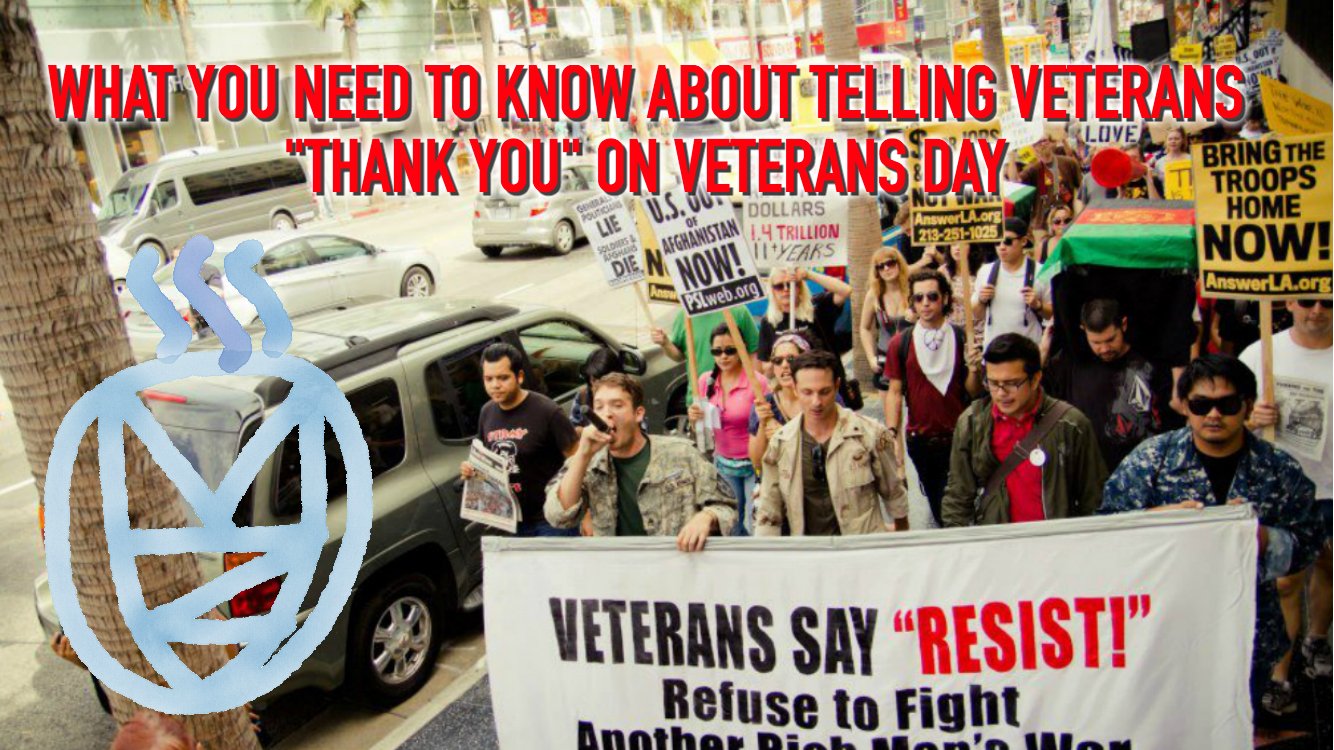
Every year, on November 11th, the phrase "thank you for your service" becomes the most used phrase of the day here in the United States, as countless Americans rally in support of all their veteran friends and family. But what are you really thanking us for? Do you really know? As a veteran of the United States Armed Forces myself, I've decided to shed some light on some things you should keep in mind next time you feel the urge to show your support for veterans by telling one of us "thank you" on Veterans Day.
"If we really saw war, what war does to young minds and bodies, it would be impossible to embrace the myth of war. If we had to stand over the mangled corpses of schoolchildren killed in Afghanistan and listen to the wails of their parents, we would not be able to repeat clichés we use to justify war. This is why war is carefully sanitized. This is why we are given war's perverse and dark thrill but are spared from seeing war's consequences. The mythic visions of war keep it heroic and entertaining…
The wounded, the crippled, and the dead are, in this great charade, swiftly carted offstage. They are war's refuse. We do not see them. We do not hear them. They are doomed, like wandering spirits, to float around the edges of our consciousness, ignored, even reviled. The message they tell is too painful for us to hear. We prefer to celebrate ourselves and our nation by imbibing the myths of glory, honor, patriotism, and heroism, words that in combat become empty and meaningless."
-- Chris Hedges
I started out with this quote from Chris Hedges because I felt that it fully encapsulates the theme of this post today. I wrote a poem yesterday that is also along these same lines, so feel free to check it out here for a more succinct version of the ideas that will be discussed in detail in this post that you're reading right now.
Why We Feel Alone
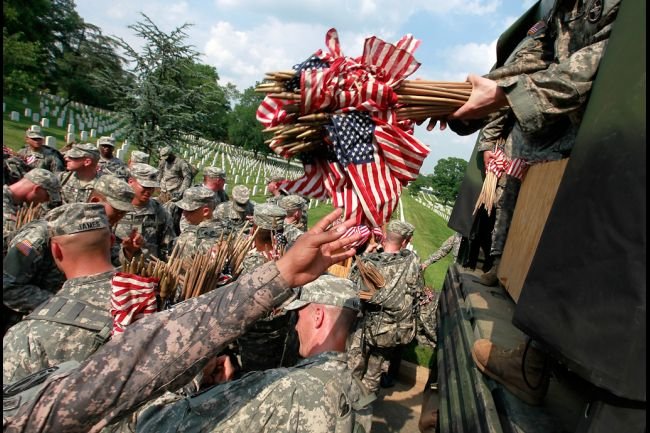
Most of us come home to the civilian life and have such a difficult time re-integrating back into society. Our whole world suddenly changes when we return to our families and we realize that things are different now. Our family and friends no longer recognize us, because our time in the military has stripped us of just about everything that made us who we were before we joined. We go from an environment where we feel the support of our fellow servicemembers and know that for better or worse we have people who will have our back no matter what, to this brave new world that we're dropped into where no one know us anymore and we no longer have that same support system that we had relied on so much during our time in the military.
Because so many of us come home with severe mental health issues, such as Post-Traumatic Stress Disorder, Traumatic Brain Injury, depression, anxiety, anger issues, etc., the lack of support we feel upon returning tends to exacerbate the situation. We become trapped in cages that we feel we will never be able to escape from because we feel like we are beyond help. Many even feel like they don't deserve any help, after doing and seeing the things that they did while they were in. So we are left to our own devices, to try to navigate the trials and tribulations of the post-military life on our own.
Twenty percent of veterans who served in Afghanistan or Iraq suffer from PTSD or severe depression, and out of those veterans, 19.5% have also suffered from TBI, according to the RAND Center for Military Health Policy Research. Despite such a large number of us coming home with these mental health issues, only about half of us in need of veteran-specific mental health treatment will end up receiving it, according to the Substance Abuse and Mental Health Services Administration. The reasons behind this are many, but here are a few important ones to note:
- Fear of being perceived as a weak person
- Feeling embarrassed about mental health issues resulting from military service
- Long waiting periods for receiving help through the VA
- Feeling ashamed about having to seek out professional help
- A lack of faith in the highly inefficient VA system
So many of us fail to get the help that we need because we feel ashamed or weak for even thinking about asking for help from someone else. I know that I myself never sought out professional help when I needed it, exactly because I didn't want to seem weak to anyone. Luckily for me, I more or less found a way to heal on my own. Unfortunately, many out there don't get as lucky and are besieged by their demons until they end up throwing in the towel altogether and become a statistic.
According to the VA Suicide Prevention Program, an average of 20 veterans commit suicide every day, based on their latest collected data from 2014. Of course, it's quite impossible to maintain 100% accurate counts on how many veterans actually kill themselves every year, so that number has likely grown since they collected that data. I say 20 a day is 20 too many. Also from their data from 2014, when veterans made up about 8.5% of the population of the United States, we constituted about 18% of all suicide deaths among American adults.
I, too, have struggled with suicidal periods in my life after coming home. Fortunately for me, I found a helpful outlet that helped me to heal and brought some distance between me and that suicidal sentiment. A few of my friends I served with were not so lucky and tragically chose to leave us. If you are a fellow veteran and ever have thoughts like that, as hard as it might be, reach out to someone. If you don't have anyone, come find me. Or if you need more immediate help, please call the Veterans Crisis Line at 1-800-273-8255 and press 1. YOU ARE NOT ALONE. I repeat, YOU ARE NOT ALONE.
Many of Us End Up on the Streets
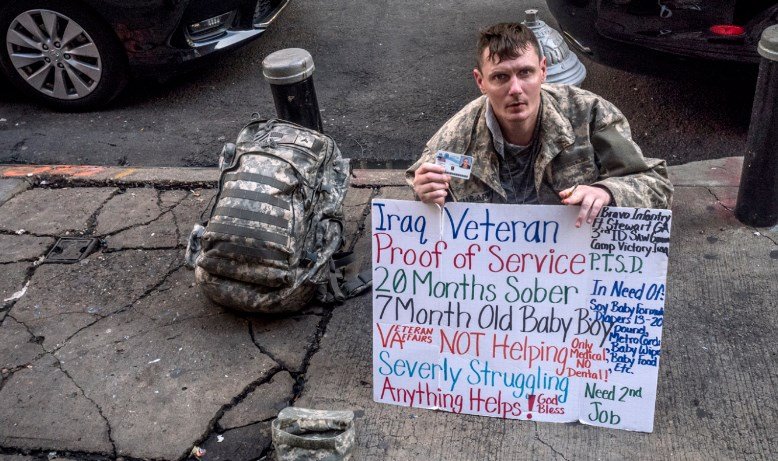
According to the U.S. Department of Housing and Urban Development, an estimated 39,471 veterans are homeless at any one time. Of course, as with the suicide statistic, exact figures are pretty impossible to come by due to the nature of transiency. Nine percent of those veterans are between the ages of 18 and 30, while 41% are between 31 and 50. In addition to this, an estimated 1.4 million veterans are at risk of falling into homelessness because of a combination of poverty and a lack of support systems in their area.
Out of the homeless population in the United States, it is estimated that roughly 11% of adults are veterans. Of the male homeless population, it is said that veterans make up 20%. Fifty-one percent of homeless veterans also have disabilities, while 50% suffer from serious mental health issues. A shocking 70% are dealing with substance abuse issues!
Many of us end up homeless because of a lack of affordable housing and sustainable income, while others find themselves on the streets as a result of their mental health issues, substance abuse, and a lack of support from family and social networks. Furthermore, many veterans find ourselves unemployable in the civilian world because our particular skill sets don't find much translation over in the civilian workforce, leaving many unable to pay rent and having no other option than to go transient.
In addition to this, many of my brothers and sisters have related stories to me of how they would apply for every job they could find that was hiring, and just about all of them told them that they would not hire them because of their status as a veteran. I suspect that I suffered the same thing a few years ago, when I was living in LA and I could not get hired for the life of me. It led me down a very dark road of depression and suicidal inclinations, because I saw myself as less of a man for not being able to find work despite all my best efforts. Luckily for me, I was living at home with my family and I did not have to pay rent, so I did not have to end up on the streets. Some of my friends have not been so lucky, and have had to undergo periods of homelessness in their lives.
So Many Try to Numb the Pain With Alcohol and/or Opioids
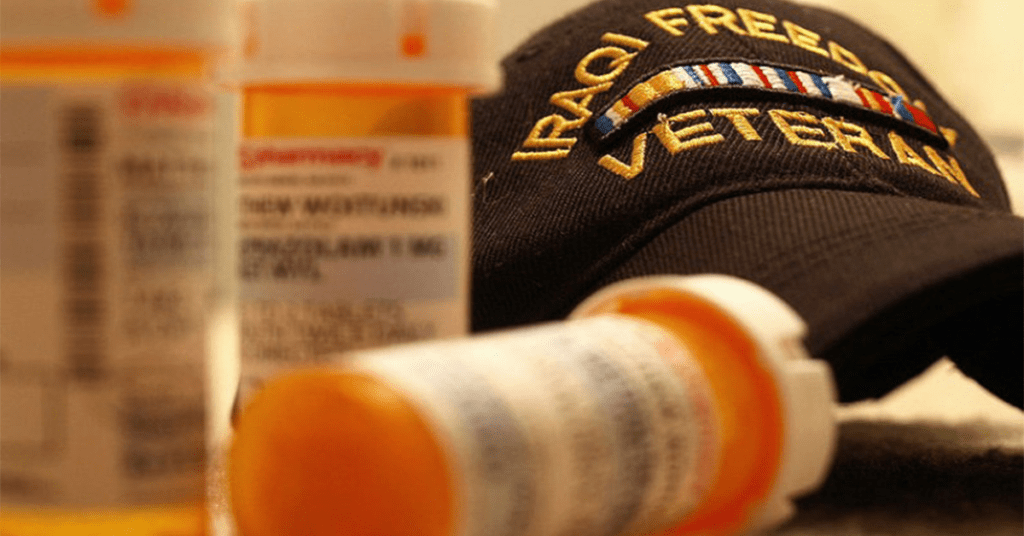
I've been lucky that my own coping mechanisms haven't involved heavy alcohol use or opioid abuse, but so many of my friends have unfortunately resorted to those substances to deal with their daily demons. According to a study by the National Institute of Drug Abuse, an estimated 25% of all Iraq and Afghanistan veterans show signs of substance abuse disorder. In addition to that, the VA estimated in 2009 that approximately 13,000 Iraq and Afghanistan veterans require veteran-specific mental health treatment as a result of suffering from alcohol dependence syndrome.
One of my best friends from the military actually has been told by his doctor that he can't drink anymore because his liver had been overworked from his extended period of alcohol abuse after getting out. Another one still turns to his pills and other harmful drugs to escape from the pain, both physical and emotional/psychological. Cases like these are far too common among veterans, and it has a lot to do with the chosen treatment methods in place at the VA, but it also has to do with my first point, how alone we feel after coming back to the civilian world.
Unfortunately, for many veterans, despite all the reassurances from friends and family, we still feel alone. I know that I had several friends try to comfort me and tell me that they were there for me, but for me, I was so far gone by that point that I didn't believe I deserved their help and so I chose to try to go it alone. I honestly can't say what's the best thing to do in this situation to try to mitigate the substance abuse outlet, but I do know now, looking back on those days, I truly appreciate everyone who made the honest effort to stick by me and help me through all those issues.
War Is A Racket
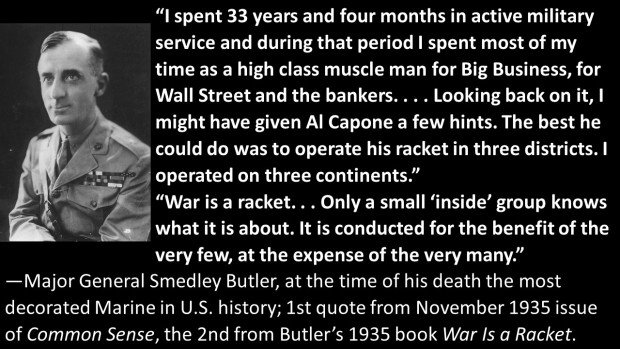
The last thing I want to talk about brings us back to the subject of the quote that I started this post with: war. When people say "thank you" to us, they are typically telling us thank you because they are under this impression that our service in the Armed Forces keeps them safe or protects their freedoms. This is a controversial subject to be talking about, but that couldn't possibly be further from the truth. War is a racket, nothing more. It has nothing to do with keeping us safe or protecting our freedoms. One of my best friends in the military used to laugh at that idea that we were going over to the Middle East to "protect our freedom." He used to always say, "Well, how did our freedoms get over to the Middle East?"
I'm never really my usual articulate self when it comes down to this particular part of the discussion, so I will let the words of Major General Smedley Darlington Butler, who was the most decorated Marine in U.S. history at the time of his death, speak for me. Below is an excerpt from his book, War Is A Racket:
War is just a racket. A racket is best described, I believe, as something that is not what it seems to the majority of people. Only a small inside group knows what it is about. It is conducted for the benefit of the very few at the expense of the masses.
I believe in adequate defense at the coastline and nothing else. If a nation comes over here to fight, then we'll fight. The trouble with America is that when the dollar only earns 6 percent over here, then it gets restless and goes overseas to get 100 percent. Then the flag follows the dollar and the soldiers follow the flag.
It may seem odd for me, a military man to adopt such a comparison. Truthfulness compels me to. I spent thirty- three years and four months in active military service as a member of this country's most agile military force, the Marine Corps. I served in all commissioned ranks from Second Lieutenant to Major-General. And during that period, I spent most of my time being a high class muscle- man for Big Business, for Wall Street and for the Bankers. In short, I was a racketeer, a gangster for capitalism.
I helped make Mexico, especially Tampico, safe for American oil interests in 1914. I helped make Haiti and Cuba a decent place for the National City Bank boys to collect revenues in. I helped in the raping of half a dozen Central American republics for the benefits of Wall Street. The record of racketeering is long. I helped purify Nicaragua for the international banking house of Brown Brothers in 1909-1912 (where have I heard that name before?). I brought light to the Dominican Republic for American sugar interests in 1916. In China I helped to see to it that Standard Oil went its way unmolested.
So you see, nothing we do while at war in the Middle East, has anything to do with keeping us safe or protecting our freedoms. It has everything to do with making a profit, seizing resources, and protecting corporate interests. So please, next time you think about saying "thank you for your service" to us on Veterans Day, keep these things in mind. Obviously, this is just my personal perspective on the whole thing, and other veterans will gladly accept your thanks for their service. Don't get me wrong, I do appreciate the sentiment behind your expression of gratitude and your display of support for us. I just wish you knew and fully understood all that it entails. I just wish you understood how you can truly show your support for veterans.

I suppose my bottom line here is, if you truly support us, and you truly want to show that support, don't just tell us thank you one day of the year. Look around for organizations and services in your area that help veterans, and help them carry out their respective missions. Reach out to the veterans you have in your life and make sure that they know you are there for them even though you have no idea how to process their struggles. And then actually be there for them when they need you. Most importantly, if you truly support our veterans, STOP SUPPORTING THESE WARS THAT POLITICIANS SEND US OFF TO FIGHT IN!
Happy Veterans Day.
Check out some of my other posts!
How I Achieved 200 Followers in My First Month on Steemit
Why I Chose to Invest $100 in Steem
My First Week on Steemit
The Dawn of The Dancing Dreamers
The Dawn of Friendship In a New Age
I'm Just an Island Boy Living in Utah who Loves EDM


!steemitworldmap 40.754539 lat -111.902618 long Salt Lake City, Utah local Steemian! d3scr
